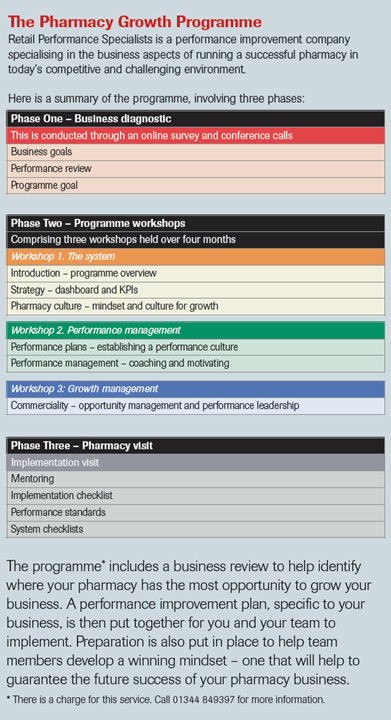The numbers you need and how to use them
In Running Your Business
Follow this topic
Bookmark
Record learning outcomes
No business can stand still and survive. As business expert Dennis Reid, chairman of consultancy firm Retail Performance Specialists, says: €You must do something to something to improve something.€

This is true in any sector or organisation. There are many examples of businesses that have been brought back from the brink of failure by doing something to improve their performance. To illustrate this, let's move away from healthcare for a moment and look at how a focus on the numbers has revolutionised sport.
Slam-dunk
When the Golden State Warriors basketball team from California was bought by Silicon Valley executives in 2010, they had not won an NBA title since 1975. This didn't deter the new owners; in fact, they saw it as an opportunity. They had reviewed the team's performance data and had identified a crucial insight €“ the basketball players were taking too few €three-pointers€.
The more common shots from inside the line were worth just two points, but if they moved back just a few inches before shooting, the Warriors identified that a player could score 43 per cent more points each time. They developed a plan to exploit this idea. The Warriors built a team around their point guard Stephen Curry, who, at 6ft 3in, is short for a basketball player. Last season he scored a record-breaking 286 three-pointers and this season he smashed this record with 402 three-pointers.
If the Warriors now progress to the play-offs to win a second successive championship, they will replace the Bulls as the greatest NBA team of all time. All this success has been due to the analysis of the numbers: forming a plan to do something differently and then carrying it through.
What businesses tell us
Retail Performance Specialists has been helping businesses improve their top-line performance and profitability for 30 years, and one of the most common challenges we encounter is the dreaded numbers.
Believe it or not, some businesses do not even have any numbers, preferring instead to simply rely on how much is in the bank. Some other businesses have too many numbers and say to us, €It's not that simple.€ In reality, though, it is that simple, and if it's not, then you're not doing it right. Even when our clients do know their numbers, they can fail to track trends or analyse the data they have, so they do not know how to move the numbers past the current level. They know they need to do better, but don't know how.
Why does it matter?
Businesses that do not know their numbers tend to make decisions on guesswork. Imagine if you were driving to a new destination and your car dashboard didn't work: no speedometer, no fuel gauge and no satellite navigation. It would be pretty worrying and challenging, but you would probably still get there in the end.
When we ask business owners if they know their numbers, they often respond by externalising €“ blaming events outside the organisation that affect their ability to keep a grasp of the figures. These are just excuses: the weather was bad, Janie had a bad day and the locum didn't turn up. The problem with this approach is we can't tell what to do about it (other than to move to a warm country or recruit congenitally cheerful people).
The numbers matter because these facts help us identify and focus on opportunities. It's not possible to grow a business based on assumptions or how it's always been done.
How do numbers help?
The only reason for tracking numbers is to identify and quantify opportunity, and from this we can decide the actions we need to take to move the numbers. Which numbers should you focus on? This is the big question. Some pharmacies focus on prescriptions and driving that number €“ chasing prescription volume. Some community pharmacies promote services such as smoking cessation, and a few are retail specialists.
Whichever you wish to be, the question is how will you thrive in this fast-changing landscape? As we know, the traditional pharmacy income from the NHS is suffering diminishing returns. You are working harder for less money.
How to move the numbers
There is a proven four-phase process that guarantees you can improve the performance of your pharmacy. It will help you to find the opportunities for your business and deliver the numbers you want to provide the lifestyle you desire for you and your family.
Phase 1: Make it clear
There are three groups of people who need to clearly understand what they are trying to achieve:
- You €“ have a clear vision on what you want the business to look like, feel like and the results you want to see.
- Your team €“ they must understand what is required of them to perform at the highest level and to achieve the results you want. You want the right team, with the right mindset and culture, with clear goals and understanding of your vision.
- Your customers €“ to achieve the status of €first- choice pharmacy€ in your community, you must clearly communicate the €why€. What is your differentiator from other pharmacies? Why should people come to you? What products or services can you offer, and why is that different from what is available elsewhere?
Phase 2: Make it real
You must review the current performance of your pharmacy and identify where you have best-in- class performance €“ where does your business excel and beat the competitors? What elements of your business are delivering results?
You also need to identify where the performance is not meeting your expectation. This is why you need to know your numbers. You can then analyse the data and break down exactly what is working and what isn't.
The more information you have, the better the analysis. Next, create a performance dashboard that will give you transparency on all areas of your business. After that, you can create a performance-improvement game plan that will deliver the numbers you want.
Phase 3: Make it happen
Once you have identified where the pharmacy can improve, explain to your team to make these improvements. need to get them to buy in to plan. Prepare non-negotiable standards for them to adhere to and find out what skills and abilities the team need to develop to ensure your plan is followed.
You will need to identify any current gaps in knowledge or skill sets and ensure that everyone is on-board and confident about any changes to the way they currently work. For example, address any training needs to ensure that all members of the team are confident about providing a new service and engaging with customers.
You can then start to implement coaching models, create devolved action plans with your team and motivate staff through performance management via individual, as well as team, targets.
Phase 4: Make it last
It's important to have ongoing performance coaching and mentoring sessions with your team to make sure you hold your people accountable and create a learning environment where new ideas emerge. This will keep customer engagement alive and motivation at a high within your team.
Look to review your game plan every month, as this will guarantee to move your key pharmacy numbers in the right direction and deliver you a new level of success. Now you can build your own skills academy: a training and development toolkit, which should include induction scheduling, engagement techniques, sales tips, daily learning modules and advice on capturing best practice for continual success in your pharmacy.
Remember, if you want to move your business forward and win in a competitive marketplace, you must do something to something to improve something.
Find out more
Dennis Reid of Retail Performance Specialists is a retail specialist who helps companies increase sales, performance and profitability. He has more than 35 years' experience and has worked with major companies including Nike, Gucci, Nokia and Marks & Spencer.
He now works with community pharmacies to deliver the Pharmacy Growth Programme, and is so confident in the team's expertise that the company is guaranteeing a 10-fold return on investment over 18 months or your fee returned.
To explore how the Pharmacy Growth Programme could benefit your business, call Andrew Reid on 01344 849397, or email andrew@rps-global.com.

